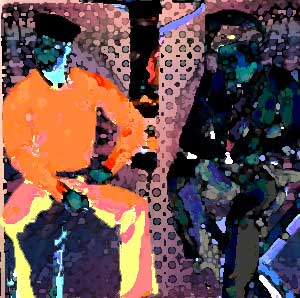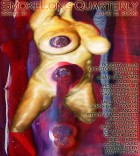This is absurd, John thinks, he’s not a prisoner. He grabs his cup and then cracks his door an inch. If someone at the conference table says something to him, he has to take a deep breath and then exhale slowly before speaking with an easy onset.
At the table, Stan says, “Come on! It had Cuba Gooding and De Niro in it! No one knows?”
If John walks out now, Stan might ask him the name and he’ll have to say something. Since last week’s staff meeting, he’s been blocking on “m” words, so the title, “Men of Honor” could be rough. He’s also been blocking on “d” words, plus “n” sounds so “I don’t know” might be out. He could just shake his head, but that might seem like he’s too good to dignify the question with a response. They already give him enough shit for being too good to eat lunch with them. Maybe he can just say, “Unsure.” But who answered a question by saying that?
He puts the cup back down on his desk. His throat is dry. Good let it be, particularly his larynx. His latest book on stuttering, “Understanding and Controlling Stuttering,” argued that John experiences blocks in his mouth and larynx because he keeps instinctively activating his Valsalva mechanism by trying to force out words when he anticipates difficulty speaking.
Shit! His phone rings. John looks at the door; it’s open more than he expects. The voices at the table have fallen silent. Is Jan taking bets whether he’ll block on his name, like he did at last week’s staff meeting?
He grabs his cup again and walks out the door. “Ooh, dodging the phone,” Jan says. “Creditors after you?”
John starts to block on saying “yes” so he just laughs instead. His neck is hot. Did everyone on the whole block decide to have lunch at the table today? Did people fly in?
Like a boxer about to go down, his legs won’t turn 45 degrees and walk to the water dispenser. Why is he locking eyes with Stan?
“Do you know the name of the movie with Robert De Niro and Cuba Gooding? It was about divers or something.” It is the nasally voice of the intern, the cause of this latest cycle of stuttering. Her eyes are too close together. Who starts a job a week early because of a need “to be continually challenged”? Who admits that to co-workers?
Everyone at the table is looking at him. He thinks about the latest book’s mantra, like so many others, that you can only get better by putting yourself in real situations, that avoiding words is the worst, that “covert stutterers” like himself may fool some people some time but not all the people all the time, that the psychological toll inflicted by constantly changing food orders and the names of movies to buy tickets for and walking around grocery stores again and again instead of asking for help – all perpetuate stuttering.
“Is that a no?” someone says.
John listens for the first sound of laughter. He looks up at the ceiling, something he has always found himself doing when encountering Oh Fuck words, like his name, address, or telephone number, words that expose him like a flasher.
He remembers crying while reading “Flowers for Algernon” in eighth grade, when Charlie went from being brilliant back to his old self, exactly how John felt when the magic wore off 22 days after graduating from his first speech therapy course.
He is now lost in what the book calls “the stutterer’s fog.” It washes over him. He is a third-grader again, hiding in a bathroom stall during assembly because the new principal wants each student to stand up and say their name.
“I …d … haven’t seen it.”
His older brother used to count his stutters at dinner and then before bed make him do three push ups for each one. Now, they only e-mail.
“Are you okay?” someone asks.
John looks over Jan’s head, over Stan. The empty cup rests lightly in John’s hands.
He pauses, unsure what to say.



 The core workshop of SmokeLong Fitness is all in writing, so you can take part from anywhere at anytime. We are excited about creating a supportive, consistent and structured environment for flash writers to work on their craft in a community. We are thrilled and proud to say that our workshop participants have won, placed, or been listed in every major flash competition. Community works.
The core workshop of SmokeLong Fitness is all in writing, so you can take part from anywhere at anytime. We are excited about creating a supportive, consistent and structured environment for flash writers to work on their craft in a community. We are thrilled and proud to say that our workshop participants have won, placed, or been listed in every major flash competition. Community works.